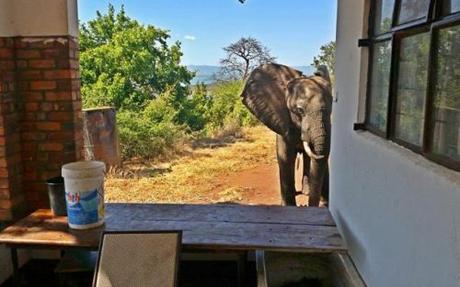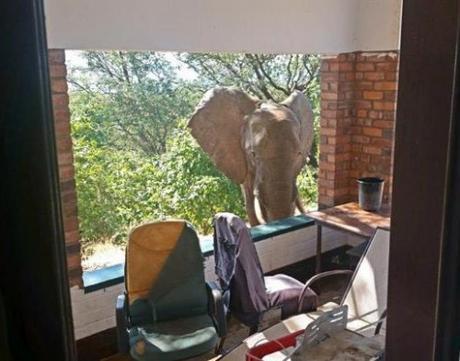An elephant, shot by poachers, sought help from a safari lodge in Zimbabwe.

Ben the elephant seeks help at Bumi Hills Safari Lodge (Photo: Bumi Hills Foundation)
The Telegraph reports, June 2, 2016, that an injured bull elephant approached the Bumi Hills Safari Lodge on Lake Kariba, in Zimbabwe, South Africa, for help after it had been shot by a poacher.

Bumi Hills Safari Lodge
The lodge’s manager, Nick Milne, quickly noticed that the elephant had a limp and appeared to be severely injured.
Unfortunately there was no in-house veterinarian at the lodge because the vet had gone for the weekend. But one kind vet offered to fly 200 miles from Harare to provide medical assistance to the elephant and arrived within six hours.
In that time, the 30-year-old elephant, who was later named Ben after the man who treated him first, waited patiently, supping on water and grazing.
When the vet arrived, Ben was tranquillized and treated for a deep wound in his shoulder, and two bullet holes in his ear.
Nick Milne told News24: “Logic would suggest that if an animal has an injury that considerably hampers its mobility, it would not attempt the climb and would rather stay on the level ground near water. The [poacher’s] dart went into his rump perfectly and he only moved off a short distance in the seven minutes before he went down. He also landed perfectly on his haunches with his right side up a slope, the perfect position considering we needed to work on his left side.”
Ben now wears a tracking device to ensure his improvement can be monitored as he recuperates in the lodge.

Ben recuperates at the lodge (photo by Bumi Hills Foundation)
Some interesting facts on elephants from Elephants Forever:
- Elephants are recognised as being among the most intelligent creatures on earth. In fact, some enthusiasts believe that their intelligence rivals that of human beings.
- Elephant brain’s neocortex is highly convoluted, as it is in humans, apes and some dolphins, which is generally accepted to be an indication of complex intelligence.
- Proportionally, the elephant’s brain is the largest at a mass of just over 5kg. Although the largest whale is 20 times the body size of an elephant, its brain is just under twice the size.
- Signs of elephant intelligence incude:
- Ability to learn new facts and behaviors.
- Self-medicate: when a pregnant mother is due to give birth, she will chew on the leaves of the Boraginaceae tree to induce labor.
- Play: throw a stick at an object; pass an object from one to another; squirt water out of the trunk.
- Sense of humor: Elephants in zoos have even been seen stealing onlookers caps and hiding them in playful teasing.
- Mimic sounds: Elephants have been recorded mimicking passing trucks, sounds made by their trainers, even sounds that they bear a strong resemblance to the spoken word.
- Use tools: Elephants have been seen digging holes for drinking water, then moulding bark from a tree into the shape of a ball and placing it on top of the hole and covering it over with sand to avoid evaporation. They also use sticks to scratch their backs when their trunk can not reach and have been known to drop rocks on electric fences to damage them. Bandula, an Asian elephant in captivity, had learnt how to release the complex hook on her shackles and would then assist her fellow “inmates” to escape from theirs.
- Self-awareness: Elephants recognise themselves in a mirror, something that is extremely rare in the animal kingdom.
- Elephants’ capacity for memory and emotions is remarkable and is due to their well-developed hippocampus:
- Elephants have a range of emotions, including joy, playfulness, grief and mourning. They give recently deceased elephants a burial ceremony, marked by deep rumblings while herd members caress the dead body with their trunks. Elephants would return to the burial ground to caress the bones of their loved ones.
- They have emotional flashbacks and experience Post-Traumatic Stress Disorder.
- The elephant is one of the few creatures (along with human beings) that is not born with survival instincts, but needs to learn these during infancy and adolescence. The brain is specially designed to accomplish this sort of life learning. Elephants and humans have a similar lifespan; both have about 10 years to learn before they are considered to be independent adults.
See also:
- A mother never forgets: Elephant spends 11 hours desperately trying to pull her baby free from muddy well
- Two elephants reunite after 25 years. Tears ….
- Rescuing a baby elephant
~Eowyn

